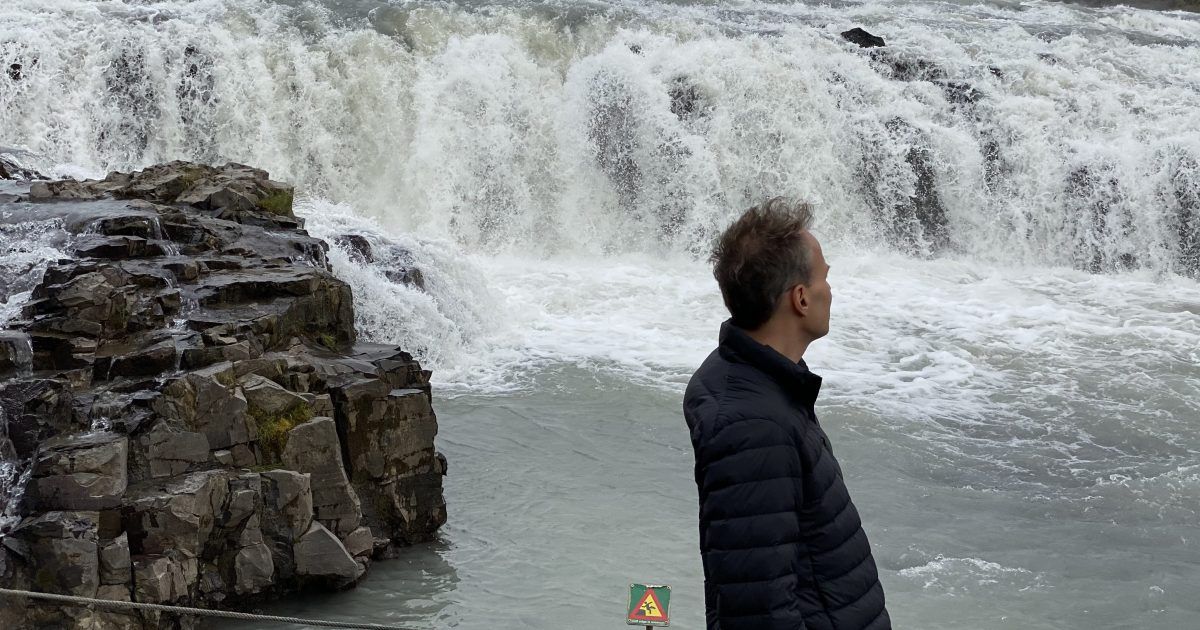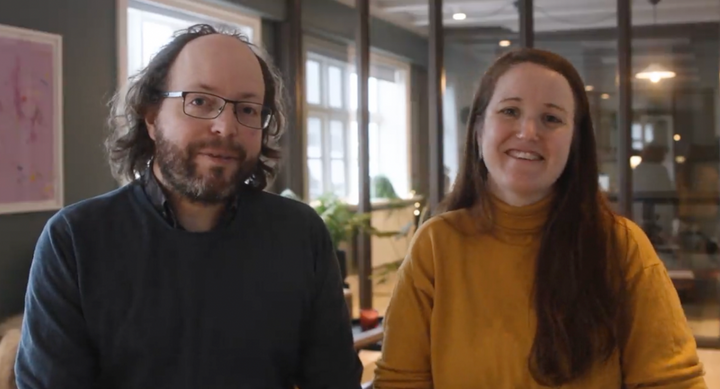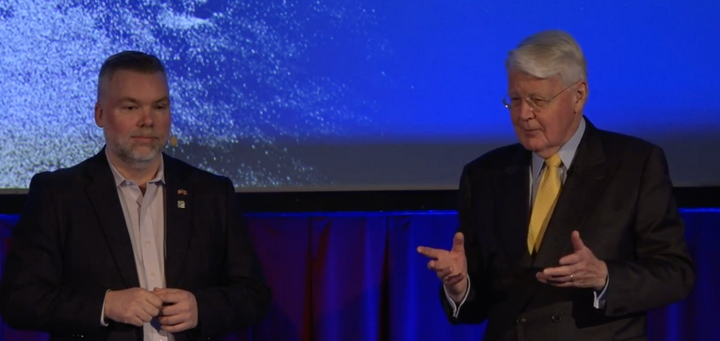Great for tourists, complex for expats - An interview with AngelList CEO Kevin Laws on his three month stay in Iceland

Last summer, Kevin Laws, the CEO of AngelList, relocated to Iceland with his family for three months. We met over coffee at Kaffi Vest back in September when it was still legal to meet strangers in person.
Kevin was a Covid-19 refugee in Iceland. He came to Iceland for business, but because the US was severely hit by the pandemic, he brought his wife and two kids and stayed for three months. He worked California hours. His workday started just around the time the rest of us in Iceland start to plan what we’re having for dinner, and ended around midnight. They arrived in mid-July and wanted to stay six months but ended up leaving mid October. They would have stayed longer, but couldn’t get their visa extended in time, and the children’s school resumed in-person classes. Some weeks after our discussion, the Icelandic government introduced a remote worker visa, extending the time remote workers and their families can stay in Iceland from three to six months.
The process of temporarily relocating to Iceland had its ups and downs. “There were three issues in particular that I ran into,” explained Kevin “One was getting here despite the travel ban. I was invited to come here by Bala Kamallakharan. I asked if I could bring my family, and he sponsored them also with the government visa office. It took a few weeks, but they did approve the visa for my whole family. The second issue was getting here safely. I was going to drive to Seattle to fly direct, but that flight got cancelled because of the ban. I had to go through Boston to get to Iceland. You have to be very careful when travelling in the times of Covid.” The third issue was trying to stay here for a longer time without a kennitala, the Icelandic equivalent of a Social Security Number. “You don’t need one if you are here only to look at some waterfalls. It’s not a legal requirement, but the assumption that you have one is pervasive throughout Icelandic society. Everybody asks for it because it’s an easy ID. I couldn’t open a bank account to pay rent, sign my son up for the football club, or lease a car long-term. Short term car rentals are fabulously expensive but leases are really cheap. I had to work through all those things that are just much more complicated.”
From 195 to one
But you still decided to come and you are still here.
“Yeah! The flip-side is that Icelanders in general have been very welcoming and very helpful coming up with solutions to the kennitala issue. The football club just told us to start showing up and I’ve had at least four people offer to lease the car for me as long as I promise not to crash it. It’s actually been really easy to integrate and solve the occasional frictions. Living here is very pleasant.”
Why did you decide to come?
“The first thing I tried to do when the pandemic hit was help my community. But there was really nobody in the government at the time to coordinate what we were doing. AngelList is not directly testing for Covid or making apps that can help with contact tracing. So after being sad for a week, I started making a matrix of places that would be interesting to work in if Silicon Valley was going to be less active. Where would benefit if you took distance away? Everybody is on Zoom anyway. It used to matter where you were physically. Right now, we are in this café where you bump into someone and something interesting comes out of that chance encounter. If you do it all on Zoom, your physical location doesn’t matter anymore. So I started looking at places that are remote but highly educated and entrepreneurial. Then I crossed that with how each place was handling Covid, since if the pandemic is bad they’ll be shut down too. That got me down to New Zealand, Taiwan and Iceland. And of those, two of them were solving the problem by not letting anybody in. Only Iceland was solving the problem in a way that allowed visitors, because deCode Genetics is here, there is a good healthcare system, and everyone is tested at the border. That reduced the options from 195 countries to one, which is how I decided Iceland would be a good place to work during the pandemic. So I started talking to people about what I could do here that would be useful. Since AngelList works with startups, I got in touch with Bala, who had connected with several AngelList people in the past.”
Do you think that other people could just come to Iceland on a whim like you did?
“Yes. Absolutely. It’s something people outside San Francisco misunderstand. We have a real Covid problem in the US. It’s about ten times as bad as Iceland. So tech employees are working from home anyway. It’s not unsafe – with Amazon, DoorDash, and Instacart, everything is delivered to your door. But we can’t leave the house, so it’s as if we’re all working remotely already. If you are going to work remotely anyway, it doesn’t matter if you’re four kilometers away or four thousand. I also love living in new places for months or years at a time, but I can’t do that while the kids are in school. They would kill me if I pulled them out for just one year in the middle of High School. But now they are doing remote learning in their school in the US. In fact, they are virtually attending school right now while we’re talking. I expect a lot of people will work remotely from here if the air travel itself can be safe. Actually, since arriving I’ve met many other Silicon Valley tech workers – engineers from Google and Apple and founders from YC. People are just figuring out how to come here on their own.”

You can’t remote control a company from the other side of the planet
So there’s like a hidden community of expats here?
“Well, I don’t think it’s particularly hidden. It’s just that they all showed up very recently. When I arrived, friends in the US started introducing me to people they knew who had also moved here. Then those people introduced me to more people they knew, both local and from elsewhere, and I very quickly got to know a lot of people.”
When things are back under control, do you think this trend will continue or go back to the way it was before?
“Some of the good effects will endure. I wouldn’t be able to manage remotely if the rest of my office were in person in San Francisco. The kids would also have to be in school. So when the pandemic is over, I won’t be able to stay. However, I’ve met over 40 people in the start-up community in the last few months. I’m interested in what they are doing, and I’ll make connections for them in the Bay area. That network of friends I’ve made while I was here will absolutely stay. I don’t plan to lose touch with them just because I’m far away. Now ‘remote’ just works the other way.”
Let’s draw up a scenario of the world going back to what it used to be. Would you consider having some of the people that work for you remain remote for a few days of the week, a few weeks at a time or event months at a time and relocate themselves anywhere in the world?
“Most certainly. First of all, a lot of companies, including ours, have done that. Even though we don’t know when the pandemic is going to end, we’ve declared that we are remote until at least the summer of 2021. The reason for that date is that people with children need to figure out where they are going to be for a full school year. So even if people can return sooner, they aren’t required to return until July or August. A lot of companies in the Bay area are doing that. Second, one of our AngelList companies, Product Hunt, decided to go completely remote. I know of several companies doing that, startups in particular. Even after the pandemic, they will stay remote.”
That’s a huge expense you can just get rid of.
“Exactly. Half of their people were already working remote so they just thought it better to become a remote-first company. Product Hunt has great people in France, India, Bulgaria – all over. Of course, that won’t work for every company. It depends on what stage they’re in and their work style, but for a lot of companies it will become a very reasonable option.”
Do you like Northstack?
Our coverage is made possible by the support of people who like you, through small monthly donations. Supporting Northstack will help us keep up the discussion, news, and analysis of Icelandic startups, tech, and venture capital.
Yes, I’ll help by supporting Northstack!
Random connections don’t happen over Zoom
What is the main drawback of not being together in the office?
“There’s something special about motivation in person. You can tell I’m talking excitedly right now. I would not be talking with this much passion if we were looking at each other over Zoom. There’s just something about the in-person connection that is so important for projects when they are in their nascent stages. I know there’s even been some academic research on this. It is those random connections that happen in person that lead to success. Those random connections don’t happen over Zoom; only when I meet with you and we meet a friend of yours and then we meet them again tomorrow. That really takes being physically present. That’s why I think there are two groups that are interested in moving here. One group is composed of the early stage start-ups that want to bring three or four people here where they can all work together rather than over Zoom. The other group is composed of engineers who are working remotely anyway. Though I’m not an engineer anymore, I’m more in the second category. I can really work from anywhere I want.”
What surprised you the most when coming here?
“A couple of things surprised me. I’ve been here as a tourist before but moving here was definitely different. Over the last ten years, Iceland completely set up the country to be easy for tourists. But as soon as I tried to plug into local things tourists don’t do – like trying to rent a saxophone for my son’s music lessons – I found the system isn’t set up for that. I can’t just Google it and find a good service with ratings that resolves the issue instantly. And that was a surprise, given how easy it was being here as a tourist. I’m just glad Icelanders are so open and helpful – nothing was impossible, it just took lots of time to resolve,” Kevin says with a warm smile.
“The other surprise was what startups needed the most. I’ve talked a lot about how important the network is. I learned that from the startups here. It didn’t occur to me that that would be an issue since so many Icelanders have connections to the outside. But that was the number one thing local startups said was a problem for them. Every startup has problems raising money and finding talent. Those are normal start-up problems. But just needing to find people to talk to about similar business issues was an unusual start-up problem, certainly coming from Silicon Valley. In Iceland you can get to everybody through one degree of separation. The same is true for me in Silicon Valley. But it is not true for Iceland from Silicon Valley and vice versa. It’s that connection that surprised me given how networked the online world is today.”
The start-up environment is not a zero-sum game
When our discussion was nearing an end, Kevin asked how he could best spend the remainder of his limited time in Iceland.
“What’s the best way for me to try to set something more permanent in motion that helps the ecosystem here? I don’t know what that is yet. Maybe it’s working on the ‘bring-your-own-job-visa’, so there is a more steady flow here, maybe it’s trying to find ways for groups that work with start-ups to connect. That’s what I’m looking for. Is there a bite-sized project I can do in the time I have here?”
“AngelList is a mission-based company. We fund over half of all top seed-tech start-ups in the markets we actively serve. It’s not entirely altruistic – anything that helps the ecosystem also helps AngelList, but the benefit doesn’t need to be direct. Anything that helps more startups get off the ground and succeed also helps our business.”
That’s one of the things that, for someone with a more conventional background like myself, I find fascinating. The start-up scene is not a zero-sum game. When you have better companies and a better ecosystem, everybody flourishes.
“You could get me going for hours on that. It is my favorite thing about the tech-startup ecosystem. I have helped some companies a lot. I have also gotten compensated very well for what I do. But it’s not always a direct connection. For example, I might take a lot of time to help one startup only to see it fail. But somebody there starts working at another start-up and only needs an hour of my time to make a connection and gives me some advisor shares in a company. Those shares become very valuable when the company succeeds. You just can’t predict what will happen. So you can’t sit around trying to figure out how you and I are going to benefit from this – we just help each other. And it works out for us all as the businesses succeed. It’s what I love about this business. If your instinct is to be helpful, startups are one of the few industries where you don’t feel like you are being taken advantage of all the time. It all works out in the long run.”
This interview was published in collaboration with Kjarninn. You can find an Icelandic version there.
In-depth Interviews like these are made possible with the generous support of our monthly supporters. Learn more here how you can support Northstack – analysis and journalism about the Icelandic startup ecosystem.




